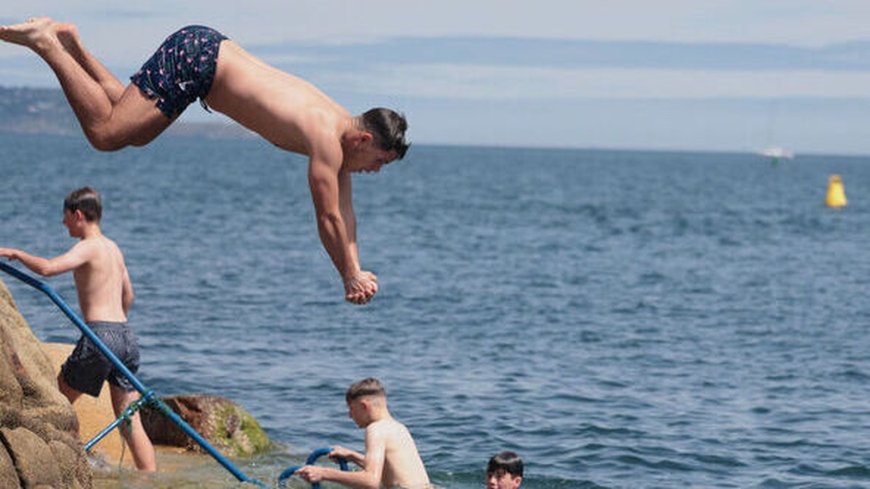Swimmers Urged to Be Cautious During Hot Weekend
The RNLI is advising people to exercise caution when swimming this weekend due to high temperatures and rip currents. A Status Yellow high temperature warning is in place for 14 counties, with temperatures expected to reach near record highs. Water Safety Ireland warns of increased risks and urges responsible water activities. Tips for staying cool indoors and outdoors are also provided.

The RNLI has warned people planning to head for a swim during this weekend's hot spell to urge caution and to be aware of rip currents.
Temperatures this weekend could reach near Ireland's all-time highs as Met Éireann has forecast temperatures in the 'low 30s' for parts of the country.
The highest recorded temperature dates back to 1887, when Kilkenny Castle hit 33.3C, and forecasters are predicting that Saturday's temperatures could come close to this.
A Status Yellow high temperature warning is in effect for 14 counties, and will be extended countrywide from midday Saturday.
Water Safety Ireland has warned that amid the sunshine and rising tides, the risk to people also goes up.
They've urged people to enjoy activities in and around water responsibly.
The RNLI's Water Safety Lead has also advised people heading for a dip to go to a lifeguarded beach, because they will have checked for rip currents that morning and will put up flags in areas safe for swimming.
Speaking on RTÉ's Morning Ireland, Linda-Gene Byrne said rip currents are 'very, very dangerous and very hard to spot'.
'You can get caught in a rip current so easily,' she warned.
'If you can stand, if you put your feet to the ground, try and wade out to the sides of the rip current ... if you can't, float to live,' she said.
'Lie on your back, ears submerged in the water where your mouth is out of the water.
'Try and relax and breath. Move your hands and legs and float. That fast moving water will bring you back out but it will eventually start to dissipate as it goes out so you'll be able to go out to the side of the rip, parallel to the shore.
'Do not try and swim against the rip, it's a futile exercise, you will just tire yourself out.'
She added: 'If you do get taken out a good bit on the rip and you're out a good bit and feel like you can't get back in, put your hand up and shout for help.'
Ms Byrne advised anyone on the shore who spots someone in trouble in the water not to try and rescue them.
'If they've gotten caught in a rip current, you're going to get caught in that rip current too,' she said, adding that they should ring 999 or 112 and ask for the Coastguard.
'Try to give the Coastguard as much information as possible,' she said.
Ms Byrne said it is important to use your voice to reassure the person in trouble.
RNLI advises going to beaches with lifeguards
Ms Byrne said she would always advise going to a beach that has a lifeguard on duty.
She said people who are new to the area should chat to locals to get an idea as to what beaches in the area are safe and to always adhere to signs.
People enjoy the warm weather on Burrow Beach, Dublin (Photo: RollingNews)
She also said lakes and rivers will also be very popular this weekend, and she warned that they tend to be colder than the sea.
Cold water shock passes in about 60 to 90 seconds and she advised people hit by it to 'not panic, float on your back'.
Ms Byrne warned that there are often hidden dangers in lakes and rivers, such as rocks and debris, and people should be careful when jumping in.
Meanwhile, a red forest fore warning is in place due to an 'extreme fire risk'.
The Department of Agriculture, Food and the Marine said called for 'high vigilance' in the coming days.
Met Éireann has forecasted temperatures in the 'low 30s' for the weekend (Photo:RollingNews)
Advice issued for dealing with high temperatures
The HSE has said that people most at risk during hot weather include:
Babies and young children
People over 65 and those with underlying health conditions, including heart and breathing problems as well as Alzheimer's disease and dementia
People who spend a lot of time outside or in hot places - such as those who work outdoors or the homeless - are also at high risk.
The advice for staying cool indoors is:
Turn off lights and appliances not in use as they generate heat
Close windows that face the sun during the day and open them at night when temperatures drop
Close curtains in rooms that are exposed to the sun, sprinkle water over the skin, or keep a damp cloth on the back of the neck
Use an electric fan (but only if the temperature is below 35C)
Outdoors, people should:
Stay in the shade
Avoid being outside, if possible, between 11am and 3pm - the hottest part of the day
Wear light and loose-fitting clothing that covers the skin
Wear a wide-brimmed hat and sunglasses
Regularly apply a UVA and UVB water-resistant sunscreen to skin that is not covered, using factor 30+ for adults and 50+ for children
People are also advised to drink plenty of fluids. Water or oral rehydration sachets are considered the best option.
What's Your Reaction?
 Like
0
Like
0
 Dislike
0
Dislike
0
 Love
0
Love
0
 Funny
0
Funny
0
 Angry
0
Angry
0
 Sad
0
Sad
0
 Wow
0
Wow
0















































































































































































